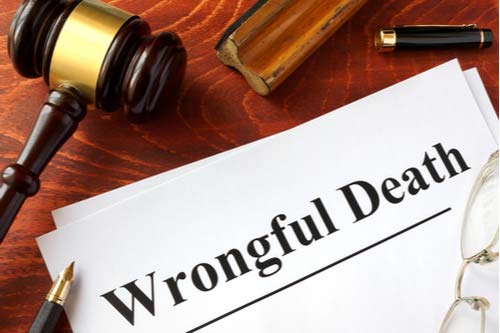Losing a loved one as a result of another party’s negligence or carelessness can be traumatic and overwhelming, especially if that individual was the supporting member. One moment you were enjoying life together, and the next they are gone.
Fortunately, there are laws that hold liable parties accountable. And while there is no amount of money that can bring back your family member, making a wrongful death claim can help provide financial support during a crisis.
If you have a loved one who died as a result of another party’s negligence, get in touch with a Tucker wrongful death lawyer. The team at The Hurt Boss understands your pain and is ready to review your case and fight for your rights. Call our Tucker personal injury lawyers today at 678-806-7715 to schedule a free case review.
Table of Contents
How Is Wrongful Death Defined in Georgia?
Every state in the United States has varying definitions and laws in regard to wrongful death and Georgia is no exception. According to the Wrongful Death Act which has existed for over a century, wrongful death is defined as the death of an individual caused by negligent, criminal, or reckless acts of another party (a person or business).
The Wrongful Death Act has 5 code sections that outline the different possible grounds for a wrongful death claim. They include:
- Medical malpractice like surgical errors, medical errors, and misdiagnosis.
- Fatal car accidents caused by negligence
- Criminal acts like intentional homicide
- Nursing home neglect or abuse
- Driving under the influence of alcohol or drugs
- Contaminated food in commercial establishments
- Pedestrian accident fatalities
- Inappropriate alcohol service like selling alcohol to an overly intoxicated person.
- Faulty engineering and construction practice.
Who Is Eligible to File a Wrongful Death Claim?
In Georgia, the law states that only individuals with certain relationships with the deceased qualify to file a wrongful death claim on their behalf. The privilege first goes to the surviving spouse. If they had minor children, then the spouse will also make the claim on their behalf. The law also states that the surviving spouse can’t receive less than a third of the settlement, no matter the number of children.
If there is no surviving spouse, the next parties allowed to file a claim are surviving children followed by the surviving parents. The representative of the decedent’s estate can file a claim if the deceased has no surviving spouse, children, or parents.
The deceased individual may have appointed a personal representative in their will or estate plan. However, if that is not the case, the court may assign someone to take on the role during the probate process. When the personal representative makes the claim, the damages recovered will go to the estate in order to benefit the next of kin.
What Types of Damages Are Recoverable in a Wrongful Death Claim?
There are two distinct types of damages in regard to wrongful death claims in the state of Georgia:
Losses by the Deceased
Surviving family members can seek compensation for “the full value of the deceased’s life.” This covers both economic and intangible losses.
- The intangible losses are things that people value most like spending time with family, having fun, playing sports, etc. It is difficult to put a monetary value on such things, but the court does its due diligence to provide justice for families.
- Lost benefits and wages – This is the tangible aspect of an individual’s life. An example is the amount of money the deceased would have likely earned throughout their life. However, since they are dead due to the negligence of another party, the surviving members need to be compensated.
Losses by the Family
The second form of claim is designed to handle the losses the surviving members have experienced as a result of the individual’s death. It’s also made by the surviving family members or the estate’s representative. Damages recovered in this type of claim include:
- Medical bills related to injury or illness of the deceased
- Burial & funeral expenses
- Loss of companionship
- Loss of guidance and support
If the surviving spouse files a wrongful death claim and the deceased did not have a will, the law requires them to share the settlement with the surviving children. The spouse will be awarded one-third of the proceeds, and the rest divided among the children. If the children are under 18 years of age, however, the guardian will be given custody of their share until they’re of legal age.
Can the Surviving Family Members File for Punitive Damages?
Punitive damages aren’t mentioned in Georgia’s wrongful death act. As such, judges strictly interpret the law and don’t permit the award of punitive damages in wrongful death claims.
However, punitive damages are possible in an estate claim. In this type of claim, the estate seeks to recover expenses like funeral costs and the deceased’s medical bills. The estate can also pursue damages for pain and suffering by the deceased if he/she didn’t die immediately.
Even if the deceased only survived for a few seconds, it’s possible to seek punitive damages. Similar to personal injury cases, punitive damages in estate claims are awarded where the court decides the party at fault intended to harm the deceased or when they showed extreme disregard for others’ wellbeing.
Claims for punitive damages tend to be hard to prove and you will need a great attorney on your side. This is where the team at The Hurt Boss comes into the picture.
How Is Negligence Determined in a Wrongful Death Case?
Negligence simply refers to the failure to practice care towards other people in a manner that a reasonable individual would. When it comes to wrongful death claims, it is imperative to prove that the other party acted in a negligent manner in order to make your case valid. Failure to achieve this means you have no valid claim.
When it comes to proving negligence in the state of Georgia, the focus is usually on the following four elements:
Duty of Care
The first aspect of proving negligence is showing the defendant owed the deceased a duty of care in the situation that resulted in death. Duty of care refers to the obligations an individual owed to another party.
The duty of care means that the defendant had the responsibility to behave responsibly. For example, a motorist should not speed or drive while intoxicated and should follow traffic rules.
Breach of Duty of Care
Breach of duty of care refers to a party’s failure to meet the obligations owed to another party. Here, you need to show that the other party breached the duty of care. This can happen through actions or inactions that a reasonable individual would have avoided. An example is when the defendant did not pay attention while driving.
Damages
Here, you are expected to show that the defendant’s actions led to physical, emotional, and financial harm. Damages in a wrongful death case include the death of your loved one, lost wages, medical expenses, and loss of companionship.
Causation
You need to show that there’s a direct connection between the accident and the other party’s negligence. The defendant’s negligent actions should be the actual or proximate cause of the death. This means that the accident couldn’t have occurred if it wasn’t due to the defendant’s negligence.
How Do You Start a Wrongful Death Claim in the State of Georgia?
Before starting a wrongful death claim, you need to ensure you are within the statute of limitations. This is the time limit you have to make a claim. In Georgia, you have 2 years from the death of your family member to file a wrongful death claim. If you miss the deadline, you will not have legal grounds to make a claim and the court will simply dismiss your case.
However, there are situations where this limit may be extended. An example is when there is an ongoing criminal case dealing with the same events as your case. As such, the time limit will be suspended until the criminal case is concluded, whereby the 2-year period will begin.
Also, in situations where the estate of the deceased isn’t probated, the time limit may be increased by 5 years, making the period your need to make a claim 7 years.
With the complexities that come with wrongful death cases, it would be unwise to not use a lawyer. Remember that they provide legal advice and tell you whether your case will hold up in front of the judge or not. Also, they will investigate the cause of your loved one’s death, and help create a solid case that proves the defendant’s negligence in court. They will also ensure you adhere to the laws and follow the due process to avoid jeopardizing your case.
What Is the Difference Between a Wrongful Death Claim and an Estate Claim?
When it comes to a wrongful death claim, you step into the deceased shoes and seek compensation for the value of their life. This means that in Tucker, GA, the court is tasked with determining what the individual’s life meant from the perspective of who has died.
Here financial damages like lost wages, work-related benefits, and medical bills are compensated. Intangible benefits like care, love, and companionship are also compensated. Parties with the right to file a wrongful death claim start from the surviving spouse, the decedent’s parents if the spouse isn’t alive and the personal representative if both parties are also not alive.
When it comes to an estate claim, the estate can seek compensation for the pain and suffering of their loved one, medical bills accrued before death, funeral and burial expenses, etc. In addition, if there are any punitive damages, they will be pursued via this claim.
If the person who passed away had a will, the administrator is mandated to present the estate claim in court. If they did not leave a will, then the laws of intestacy in Georgia will apply and appoint someone to bring the claim.
Hire a Tucker Wrongful Death Lawyer Today!
Following the unexpected death of a family member, it’s natural to be traumatized and confused about what to do. You’ll need time to grieve and accept what has occurred and given you won’t be in the right state of mind, it is important to hire a reliable Tucker wrongful death lawyer to represent you.
This is where the team at The Hurt Boss comes into the picture. With our expertise and experience, you can be certain you’ll be in the right hands. Our team will fight for you and ensure you and your family get the justice you deserve. We are well skilled and experienced in such cases and will ease the burden, allowing you to grieve in peace.
We operate on a contingency basis meaning you don’t have to worry about legal fees unless you win the case. Get in touch by calling our offices at 678-806-7715!



